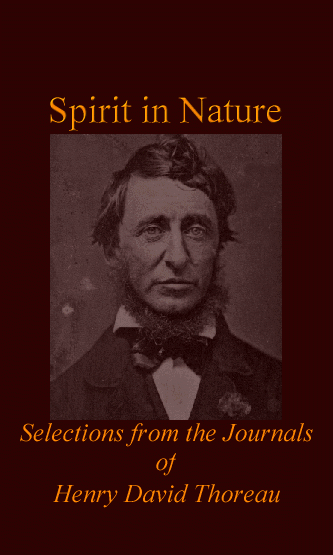



My purpose in compiling this group of selections from the notebooks of Henry David Thoreau is to emphasize the spiritual philosophy at the core of his life and work. I chose those quotes from his Journals that I thought best expressed this, but occasionally included some that are simply charming, or particularly poetic. Of course, the great bulk of the Journals is not included in the selections here offered, as there are many pages of dry records of fluctuating river heights, the shape of ice crystals, lists of birds and plants and dates observed, and so on. I also deliberately tried not to include quotations that later appeared in Thoreau's own publications such as Walden.
Note that these quotes are taken out of context: in the first place, because they are extracted from the Notebooks, but also because the author did not publish them in this (or any) context that might better illumine their meaning. This naturally leaves some obscurities and even apparent contradictions. For example, some particular quotes may make Thoreau appear anti-scientific, but that is not at all the case. Indeed, he hoped to contribute to the growing body of scientific knowledge regarding the natural world, but he did consider science a necessarily incomplete undertaking and ultimately unsatisfactory. A more profound appreciation of any object was only possible in its relation to the human and the mysterious transcendent. Rather than avoid including such selections, I have included them, without comment, and trust that the collection as a whole will be clear enough.
Even given that the quotes are out of context, they are often cryptic, sometimes almost Zen koans. I think we will be wise not to assume a failure of literary talent to convey the author's meaning, but instead to consider that the particular expression is designed to make us, and him (he who wrote these pages for himself) think. Thoreau certainly was as economical with words as he was with everything else in his life, and the purpose of such economy was always to make the little big, to diminish quantity to unveil quality.
Thoreau has been called a Transcendentalist, and he too called himself such. But to Thoreau, his transcendentalism was not some mere philosophy apart from his daily life, but was his daily life transformed into the transcendental, and he felt that neither his daily life nor transcendentalism had any significance apart from some such personal transformation. So you will find in many of the selections the relating of an observed external fact with an internal state, thought, or feeling. And, conversely, the dependence of that external impression on the internal state. The spiritual philosophy expressed in these pages was a lived one, and in that lies its continuing value.
But now let us let the man speak for himself.
















Note: Copyright and source information is available here.

